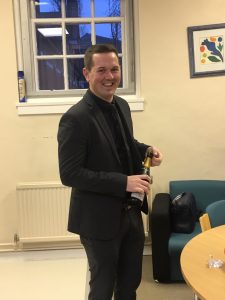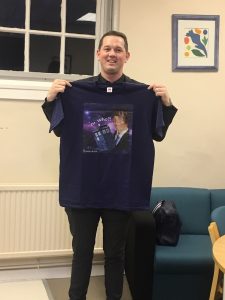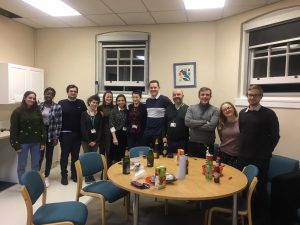The following post is written by Kevin Cunningham, who recently defended his PhD thesis in front of Dr. Stella Koutsikou (internal examiner) and Dr. Philip Aronson (external examiner).
Kevin celebrating with supervisors, examiners and other PhD students –



Background
I graduated from Kingston University with a First Class Bachelors (BSc) degree in Pharmacology. My undergraduate research project looked into anti-TNFα therapies for rheumatoid arthritis. Following this, I completed a Masters (MSc) degree in Cancer Biology at the University of Kent receiving a Kent Cancer Trust scholarship. My MSc research project was titled ‘Cross-Resistance Profiling and Morphology of the Non-Small Cell Lung Cancer (NSCLC) Cell Line HCC827 and Resistant Sub-Lines’.
PhD
For my PhD I received the prestigious Vice Chancellor’s Research Scholarship at the University of Kent, under the supervision of Prof. Alistair Mathie and Dr. Emma Veale. My PhD focused upon the two pore domain potassium (K2P) channels and their role in pulmonary disorders. The main technique I utilised throughout my PhD was whole-cell patch-clamp electrophysiology, occasionally complimented by cellular imaging.
During my second year, I was fortunate enough to visit Dr Angel Cogolludo’s lab at the Universidad Complutense Madrid, who has strong collaborative links with my supervisor, Prof. Mathie. I have also attended several national and international conferences, such as Experimental Biology 2018 in San Diego and the National Meeting of the Spanish Society of Pharmacology (SEF) 2017 in Barcelona. These have been highly beneficial experiences and I would encourage all PhD students to seek opportunities to visit other labs and conferences.
Viva
To prepare for my viva I continually read over my thesis, I got my supervisors to host a ‘mock viva’ and I tried to engage fellow PhD students in asking me questions when they had the time to read sections of my thesis. I read papers around my examiners areas of research to familiarise myself with their work and try to consider the perspective they may take when posing questions on my thesis.
Naturally I was nervous for my viva. From the start of your PhD you witness many students in the years ahead undertake their viva, however it feels a long way off and something that whilst you know you are building your way towards, somehow it will never actually happen. Whilst naturally you also hear of viva’s going horribly wrong, I found it best to keep focused and try to take no notice of these!
I found the actual examination to be a very enjoyable experience. When I have heard similar comments from fellow PhD candidates in the past, I found this strange. But talking about the work you have done for the past three years and getting alternate perspectives was a good experience. It is also surprising just how fast the process actually goes when you are in there!
Further advise would be to remember that you’ve been doing this research for more than three years, you are the expert on your topic, so try to relax! Get as many people as you can (supervisors, colleagues, parents, friends etc.) to read a part of your thesis and ask questions on it. I found this process beneficial particularly when I was trying to explain concepts to my parents, who have no scientific background. This really forced me to breakdown the information I wanted to deliver and truly focus on imparting an understanding of what I have researched. Sometimes the easy questions are the hardest to answer!
What next?
I have accepted a postdoctoral research position at the University of Western Australia (Perth), under the supervision of Professor Livia Hool. The lab I will be joining in January 2019 is a cardiovascular electrophysiology lab, which specialises in mechanisms that lead to sudden cardiac death. I am naturally very excited about my move to Australia and see the ability to travel and visit new places as another great perk to a career in science!
Click here for Kevin’s most recent publication in the Journal of Physiology.